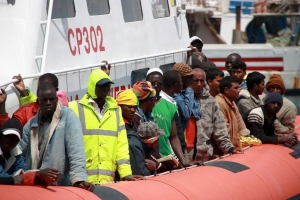
Migrants from North Africa picked up off the Italian coast. Photo by Caritas.
“The cheapest plane from Nairobi to London costs $565. What do you think would push us to spend thousands of dollars and risk our lives to get there?”
This quote from a nine-year-old Kenyan girl underlines many of the dangers and risks that migrants face when they are undocumented. These challenges, and how to address them, were the topic of this week’s Global Forum for Migration and Development in Stockholm, Sweden.
From 13 to 16 May, Caritas leaders joined other organisations at the forum to speak out about the needs of migrants, who are often vilified or simply ignored. “Not being documented means invisibility: we should provide ways to prevent the chance of becoming invisible,” said Fr. Flor Maria Rigoni, a Scalabrini missionary and migrant shelter worker in Mexico.
“The step towards criminalization is very short once we talk about ‘illegal and irregular’ migrants,” he continues. “It is also a matter of language.”
But forum participants agreed that migration can be a very positive experience. Migrants have excelled in sport, science, art and politics in their new countries. They also contribute to the economies of their home countries and their adopted countries. According to the World Bank, more than 4 million US dollars will be sent back in 2014 by remittances—one enabler for development, although not the only one.
Group participants, many of whom come from diaspora backgrounds themselves and whose families have experienced difficult journeys, came to share knowledge and draft recommendations for government leaders. They explored how positive and negative perceptions of migrants and migration affect policy, the contribution of diaspora organisations as development partners, and the right to migrate, remain, and return. They also discussed challenges like the re-integration of migrants in societies upon their return, noting that skilled or educated migrants who return to their country of origin cannot automatically help with development if they do not manage to establish a place in the community.
The forum covered the restrictions on financial transfers that hamper the full potential of diaspora contributions, and restrictions on freedom of movement, both of migration and return.
Forum participants stressed that the right to migrate and freedom of movement should be granted in all societies. Social protection and decent work conditions are other two important factors, especially for women. Tobias Billstroem, Swedish Minister for Asylum and Migration Policy, asked for more collaboration and trust between governments and civil society.
Forum participants hope to have migration included and prioritised in the Post 2015 Development Agenda.
One afternoon was broken by the news of another fatal boat accident near the Italian island Lampedusa, where dozens of migrants hoping to reach Europe lost their lives.
“We prayed for them,” says Silvia Sinibaldi, Policy and Advocacy Officer of Caritas Europa. “We must keep on working and struggling for concrete solutions and a more human response to migrants.”
